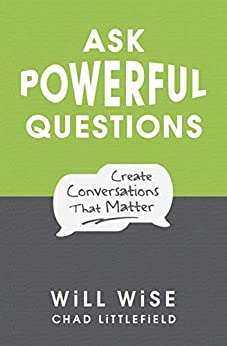While the title of this book makes it sound like a coaching book, it is more about a lifestyle or a process of building meaningful relationships. Ask Powerful Questions: Create Conversations That Matter is a book written by Will Wise along with Chad Littlefield. The book presents guidance for “asking intentional, empathetic questions that are rooted in our natural, genuine curiosity and followed up with deep listening.” Such questions, done well, lead to deeper conversations, better understanding, and stronger relationships.
 The book is structured around a pyramid of ever-deeper skills that can develop the ability to ask these powerful questions, and more importantly, to develop a mindset that prompts one to ask questions rather than providing self-centered information or opinions. The pyramid has five levels of skill development that the authors believe to be necessary in developing the skill of asking powerful questions. Beginning at the bottom, or foundational, level of the pyramid, the five levels are as follows:
The book is structured around a pyramid of ever-deeper skills that can develop the ability to ask these powerful questions, and more importantly, to develop a mindset that prompts one to ask questions rather than providing self-centered information or opinions. The pyramid has five levels of skill development that the authors believe to be necessary in developing the skill of asking powerful questions. Beginning at the bottom, or foundational, level of the pyramid, the five levels are as follows:
• Intention (The Power of Clear Intention) – “I am willing to know you”
The authors claim, “You can only unlock the true potential of your questions by first being clear about the intentions you’re setting forth both for yourself and in sharing with others.” There are two levels at which we need to consider intention. First, as a questioner, we must understand and be driven by intention that is driven by curiosity and understanding, not some subterfuge or effort at manipulation. Also, the recipient of our questions must have an understanding or comfort with the questions’ intention. This might be inferred as part of a conversation but might also be a clarifying statement by the questioner.
• Rapport (The Power of Being Present) – “I see you”
Rapport means building a relationship of trust. You might be able to ask a simple, yet powerful question of a perfect stranger, let’s say the cashier as you are buying groceries. But to actually develop a meaningful conversation, a certain degree of trust is necessary. So, rapport or connection is a prerequisite, but connection is also generally the result of a conversation driven by powerful questions.
• Openness (The Power of Being Open) – “I hear you”
Of course, powerful questions are open-ended questions. But this openness, as the third level in building the pyramid, refers to our approach to a question; there is a requirement to be open-minded if we are truly asking powerful questions. This means that we are willing to receive and accept any answer without judgment and without any sense of the “right” answer. At this point in the book, the authors caution against using questions that begin with the word, “why,” and also against using questions that include the word, “you.” Both of these words can easily prompt defensiveness in the recipient.
• Listening (The Power of Reflective Listening) – “I get you”
There is no power in a question if we are not ready to devote all of our attention to the answer. In this chapter of the book, the authors spend some time describing deep or active listening. They provide some powerful tools for reflective listening and break them various reflective listening methods.
• Empathy (The Power of Connection) – “I feel with you”
Empathy can provide power behind the connection. The authors compare empathy with apathy and sympathy and state, “Choosing empathy allows the relationship to move toward connection, allowing for compassionate action. Apathy and sympathy can have the opposite effect and actually pull people apart.”
Throughout the book, the authors identify the traps that inhibit our powerful questions, a potential antidote for the traps, and tools to overcome or avoid the traps. At the end of each chapter presenting the skill levels of the pyramid, there are practical exercises to build the skill. Throughout the book, the authors cite research to reinforce the importance of these skills and offer relational and practical wisdom.
This is an excellent book with very practical advice about asking powerful questions. These powerful questions can assist us in developing great conversations and in building stronger relationships in any part of our life.

Add your comment